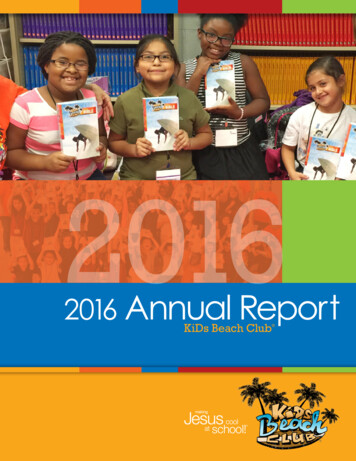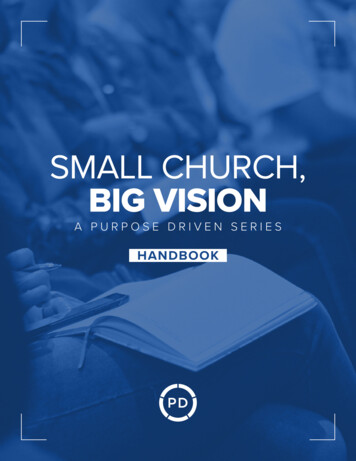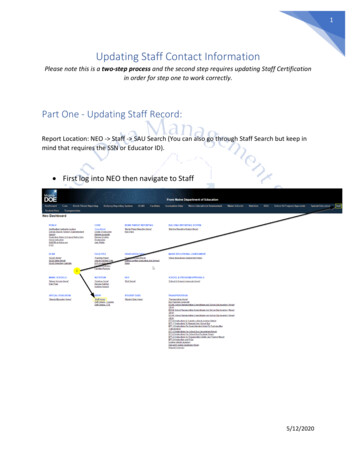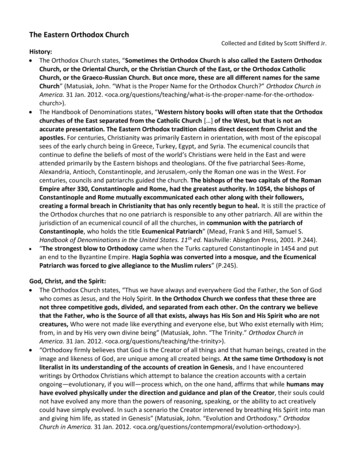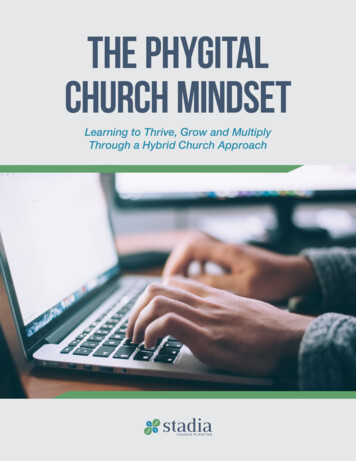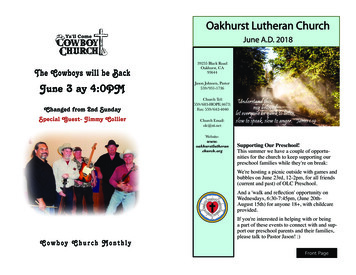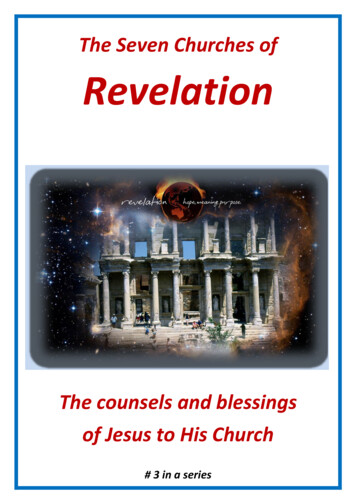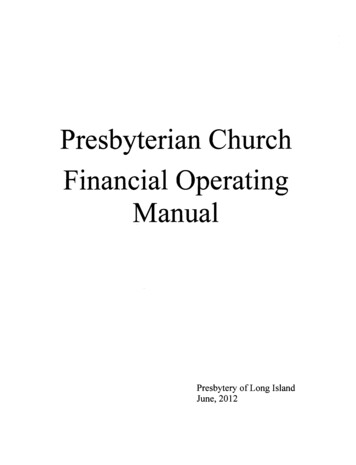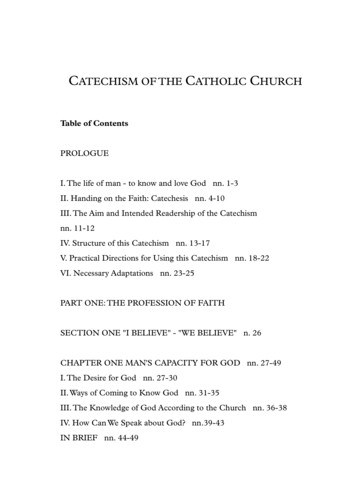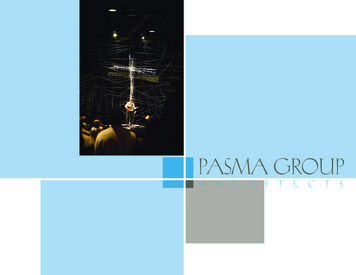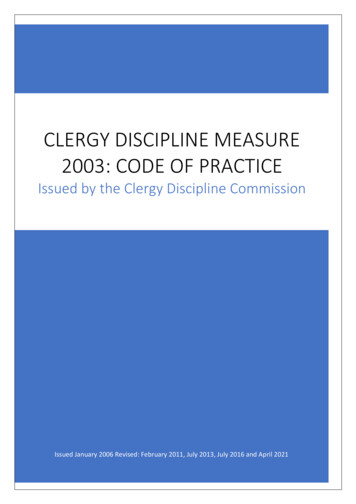
Transcription
CLERGY DISCIPLINE MEASURE2003: CODE OF PRACTICEIssued by the Clergy Discipline CommissionIssued January 2006 Revised: February 2011, July 2013, July 2016 and April 2021
PREFACEThis Code of Practice offers general guidance on how formal allegations of misconduct againstclergy of the Church of England are made and determined under the Clergy Discipline Measure2003. The Code explains on what grounds an allegation can be made, by whom they can be made,and how they are to be made. It shows the proper procedures and it describes the various optionswhich may be pursued if an allegation proves to be well-founded.The Code is not intended to be, and cannot be, a detailed work on all aspects of the disciplinaryprocedures. Instead, it aims to be a relatively simple guide, to point users in the right direction,and to draw their attention to the relevant provisions of the Measure and the Clergy DisciplineRules.The Clergy Discipline Commission, which produced this Code, has responsibility also for givingguidance specifically to those who have particular functions to perform in connection with clergydiscipline. In addition, its duties include giving advice to disciplinary tribunals and bishops as tothe penalties which are appropriate in particular circumstances. Where relevant, this Code shouldbe read in conjunction with the Commission’s other guidance.‘Clergy Discipline procedures and the Professional Guidelines are designed to protect three parties: theaccused, the accuser and the Church. It is important to mention the last of these because it can easily beforgotten that professional ethics are not simply a matter for individuals. While they undoubtedly exist toguide and protect individuals they also serve to safeguard the profession. They are an expression of mutualaccountability and responsibility. When one clergyman or woman acts unprofessionally, he or she threatensto bring the Church as a whole into disrepute – witness the ripple effect of scandals. As Eric Mount hascommented: “Moral responsibility includes being responsible people within institutions.” Or in St Paul’swords, “We are members one of another” (Ephesians 4.25).’Extract from the Guidelines for the ProfessionalConduct of the ClergyThe Rt. Hon. Dame Sarah Asplin DBEChair of the Clergy Discipline Commission2
CONTENTSPage/Paragraph No.Flowchartpage 9Materialspage 10INTRODUCTIONPurpose of the Code of Practice1Purpose of discipline4Training7Three stages for allegations of misconduct8The Overriding Objective9BEFORE FORMAL PROCEEDINGS ARE INSTITUTED; “Stage 1”Minor complaints13Procedure for the resolution of minor complaints19AFTER FORMAL PROCEEDINGS ARE INSTITUTED; “Stage 2”Who exercises discipline?22Who can be disciplined under the Measure?25On what grounds can disciplinary proceedings be brought?30What is not covered by the Measure?34What are acts or omissions contrary to ecclesiastical law?36What is the duty to have ‘due regard’ to safeguarding guidance?38What is neglect or inefficiency?40What is unbecoming or inappropriate conduct?43Who can start disciplinary proceedings?47Who can make allegations in respect of non-parochial clergy?56Will help be available for complainants to make a formal written allegation ?60Sending and receiving documents63How is an allegation of misconduct made?64Allegation must be in writing65No anonymous allegations will be considered66Complainant must set out grounds683
Written evidence in support must be provided70Police and medical records75To whom is an allegation of misconduct made?79When can an allegation of misconduct be made?82Extension of time limit by the President of Tribunals83When should an application for permission to bring an allegation out of time be made? 86What about disciplinary proceedings for employed clergy?89What happens if the allegation concerns criminal conduct?90What happens if the allegation relates to marital misconduct?93How can time for dealing with an allegation be extended until other related proceedingshave finished?94Receiving an allegation of misconduct95Acknowledgement of the allegation of misconduct97What is the role of the registrar?99What does sufficient substance mean?101Can the registrar delegate?107Who notifies the respondent about an allegation of misconduct?108Help and advice for respondent clergy113Consulting the complainant for clarification114What if more time is needed for preliminary scrutiny?119What should be in the registrar’s report?122Registrar as bishop’s legal advisor123Registrar’s report where more than one allegations or complainants127The bishop’s role130Delegation in cases of conflict of interest131Clergy under the oversight of a Provincial Episcopal Visitor134What care and support will be given during disciplinary proceedings?136Care and support: bishop is chief pastor of all within the diocese136What can the bishop do on receipt of the registrar’s report?142Dismissal by the bishop of an allegation under section 11(3)143Complainant’s right to request a review of a dismissal under s11(3)148The respondent’s answer to the allegation1514
Can the bishop suspend whilst the allegation is considered?157How long can the bishop take to decide what to do?158Who can the bishop meet when deciding what to do?159Decision to take no further action162Review by the President of Tribunals166Decision that there should be a conditional defermentRecord of conditional deferments169170Decision in favour of conciliation176What is conciliation?177Both complainant and respondent must agree to conciliation attempt178Appointment of the conciliator (or joint conciliators)182The conciliator’s written report186What happens if conciliation attempt is not successful?188Decision to impose penalty by consent: general considerations189Complainant & respondent may make representations196Respondent’s consent must be in writing in prescribed form197Written confirmation from the bishop198Decision to impose penalty by consent: resignation or prohibition200Resignations that are not by way of penalty by consent200Resignation before an allegation is made or considered201Right for respondent to withdraw consent within 7 days203Written confirmation from bishop205Decision in favour of formal investigation207What happens if there is a criminal conviction?208Procedure if respondent upon conviction receives prison sentence208President of Tribunals must be consulted209Review by the archbishop of decision to impose a penalty211What happens if there is an acquittal at a criminal trial?212What happens if there are divorce proceedings?213Procedure if petition is based on adultery, unreasonable behaviour or desertion213President of Tribunals must be consulted214Review by the archbishop of decision to impose penalty2165
Barred clergy under the Safeguarding Vulnerable Groups Act217Duty on clergy to report218THE BISHOP’S DISCIPLINARY TRIBUNAL; “Stage 3”What is a formal investigation?221Nature of the formal investigation223Designated Officer’s written report to the President of Tribunals227President decides if there is a case to answer230Appointment of members of the tribunal233Respondent may make representations about their suitabilityConduct of proceedings234238Parties to co-operate with each other238Designated Officer to conduct the case for the complainant239Independence of Designated Officer239President may direct an allegation is to be withdrawn241President may direct an attempt or further attempt at conciliation is to be made242Hearings normally in private243Power for tribunal to exclude members of public from a hearing244Tribunal’s discretion as to how hearing is conducted245How the tribunal makes its decision247Civil standard of proof247Decision of the majority248Decision to contain the reasons of both the majority and the minority249What penalty can be imposed by a tribunal250Bishop may be invited by the tribunal to make written representations251Tribunal must have reference to CDC guidance on penalties252OTHER MATTERSWhat happens if a complainant or respondent dies?253Death of respondent253Death, serious illness or incapacity of complainant254Suspension258When suspension can be imposed258To be imposed only if necessary2596
Scope of suspension261Suspension pending an application under section 9264Suspension if significant risk of harm to a child or vulnerable adult265Giving notice of suspension266Revocation of suspension268Care and support of respondent during suspension271Appeal against suspension during proceedings273Appeals from the tribunal275The Archbishops’ list278Not open for public inspection278Categories of names in the list279Review by the President of the inclusion of a name280Five-yearly review282Allegations of misconduct against bishops and archbishopsVicar-General’s court284287Removal of prohibition for life and deposition288Grounds for applying289Procedure290Removal of limited prohibition295Application must be supported by the bishopLegal aid296298Available for respondent during stages 2 & 3299Relationship with capability procedure302Confidentiality306Use of social media, websites, blogs etc.308Contempt209Publicity and media relations310Determinations to be announced publicly311Identity of children and others may be withheld from public pronouncement311Media enquiries to be addressed to appropriate communications officer313Exceptions to general rules on confidentiality3147
APPENDICESAppendix A:Procedure for the resolution of minor complaintsAppendix B:Specimen letters:page 84B1:Bishop’s letter of acknowledgmentpage 88B2:Registrar’s letter of notification to the respondentpage 90B3:Bishop’s letter to the respondentpage 92B4:Bishop’s letter to the complainant – no further actionpage 948
STEPS IN FORMAL DISCIPLINARY PROCEEDINGSUNDER THE CLERGY DISCIPLINE MEASURE 2003PCCCHURCHWARDENReferences to theCDM & RulesOTHERSs8, s9, s10r4-8forms 1a & 3COMPLAINTin writingSent to theBISHOPr9s11r10-14PRELIMINARY SCRUTINYby diocesan registrarOther proceduresmay be moresuitableWithin four weeks,the BISHOP decidess12r18If criminal,refer to PoliceNo properinterestNo sufficientsubstanceNot a disciplinematterRecognised as adisciplinary matterSuspensionDismisss11(3); r15, r16& form 4Respondent’s writtenanswer(Complainant may appeal)s36; r60-66& form 12ar17; forms 2 & 3COURSES AVAILABLENo furtheraction(Complainantmay appeal)ConditionaldefermentConciliationTribunal toadjudicateTO THE BISHOPPenalty withConsentCase to answerFormalInvestigations13; r20-22& form 5s14; r23-25& form 6s15; r26s16; r27& form 7s17; r28President considers ifthere is case to answers17; r29No case to answerNo further steps to be takenAppeal9s18, s22, s24r30-53s17; r29s20
MATERIALSThe Clergy Discipline Measure 2003 (as 017-as-published 0.pdfThe Clergy Discipline Rules 2005 (as ine/clergy-discipline-rulesThe Clergy Discipline Commission’s Guidance on line/code-practice-and-other-guidanceThe Clergy Discipline Commission’s Statutory ine/code-practice-and-other-guidancePractice Directions issued by the President of the line/code-practice-and-other-guidanceGuidelines for the Professional Conduct of the y/guidelines-professional-conductCanons of the Church of tionDecisions of line/tribunal-decisions10
INTRODUCTIONKeys a section in theClergy DisciplineMeasure 2003Purpose of the Code of Practice1.This Code of Practice is issued by the Clergy Discipline Commission under section3 of the Clergy Discipline Measure 2003 (“the Measure”). The purpose of ther a rule in theClergy DisciplineCode is to provide guidance to all who are concerned in formal clergy discipline Rules 2005procedures under the Measure.2.The Code does not have the force of law, but as a statutory code it must be takeninto account at all times. Compliance with its provisions will be assumed to be inaccordance with best practice. Using this Code is no substitute for referring tothe Measure and to the Clergy Discipline Rules 2005, which together set out theprocedures that must be followed.3.The Clergy Discipline Commission comprises no more than 12 membersappointed by the Appointments Committee of the Church of England, includingat least two people from each House of the General Synod, and at least twopeople who hold particular judicial office or particular professional legalqualifications. The make-up of the Commission is designed to promote a widerepresentation of views and experience. As well as producing this Code ofPractice, it has other specific statutory functions prescribed in the Measure, suchas giving general advice to disciplinary tribunals, the courts of the Vicars-General,bishops and archbishops on the penalties which are appropriate in particularcircumstances. The Commission cannot give guidance on penalties in individualcases.Purpose of Discipline4.The purpose of the administration of discipline is to deal with clergy who arefound to have fallen below the very high standards required and expected of11
them. For the individual member of the clergy who is subject to discipline, thisinvolves:5.-the imposition of an appropriate penalty-pastoral support-encouraging repentance and forgiveness-whenever possible putting right that which is wrong-attempting reconciliation-moving on constructively from the pastThe administration of discipline must have regard to the interests of justice forall who may be affected by the faults, failings or shortcomings of the clergy. Itmust also support the collective good standing of all faithful men and womenwho are called to serve in the ordained ministry, to ensure the clergy continue tobe worthy of the great trust that is placed in them as ordained ministers by boththe Church and the public.6.This Code throughout refers to a member of the clergy against whom a formalallegation of misconduct is made as “the respondent”. This emphasises that themember of the clergy in question is responding to a formal allegation as part ofthe process of investigating and resolving any difficulties that may have arisen,rather than simply being called upon to “defend” past actions. The person whomakes a formal allegation against a member of the clergy is referred to as “thecomplainant”.Training7.It is imperative that those involved in administering the Measure are properlytrained.Each diocese should ensure that bishops, archdeacons, Diocesansafeguarding advisors (including assistants) and any other appropriate personreceives the necessary training in order to carry out their functions underMeasure. Likewise, the NST should ensure that caseworkers receive regulartraining.The Legal Office at Church House, Westminster can assist in theprovision of training and materials.12
Three stages for allegations of misconduct8.The Measure, the Clergy Discipline Rules and the Code of Practice are allconcerned with resolving formal matters within a formal disciplinary process.There are three stages, the first of which falls outside the scope of the Measureand any formal proceedings.9.The first stage is the period before any formal proceedings are instituted underthe Measure. The second stage begins when a formal allegation of misconductis made to the bishop under the Measure and continues until the bishop hasdecided on the appropriate course to take. The third stage occurs if the bishopdirects that there should be a formal investigation to see if there is a case toanswer before a bishop’s disciplinary tribunal.Overriding Objective of the Clergy Disciplinary Procedures10. The overriding objective when dealing with formal allegations of clergymisconduct under the provisions of the Measure is to deal with all allegationsjustly.11. Dealing with an allegation justly includes, so far as reasonably practicable:(i)ensuring that it is dealt with in a way that is fair to all relevant interestedparties, including the complainant, the respondent, the respondent’sfamily, the church, and members of the wider community,(ii)dealing with the allegation of misconduct in ways which areproportionate to the nature and seriousness of the issues raised,(iii)ensuring that the complainant and the respondent are on an equalfooting procedurally,(iv)ensuring that the complainant and respondent are kept informed of theprocedural progress of the allegation of misconduct,(v)avoiding undue delay,(vi)avoiding undue expense.13r1
12. When any person or body exercises any function in connection with clergy r2disciplinary matters, regard should be had to the overriding objective. Thecomplainant and respondent are required to co-operate with any such person orbody to further the overriding objective. Any failure to co-operate may result inadverse inferences being made against a party at any stage of the proceedings.STAGE 1: BEFORE FORMAL PROCEEDINGSMinor complaints13. This Code of Practice gives guidance for the purposes of the Measure. TheMeasure is concerned with formal disciplinary proceedings which have beeninstituted in accordance with the law. It is not a ‘complaints procedure’ and itdeals only with allegations of misconduct which are serious in nature.14. However, a bishop will receive complaints from people who do not wish to invokeformal disciplinary procedures. Often, such complaints or grievances are notabout serious matters of misconduct, and can be resolved informally withoutrecourse to law if they are handled with sensitivity and without undue delay.Minor complaints should not be the subject matter of formal disciplinaryproceedings.“In fact in the case of many minor complaints an apology or aninformal rebuke may be all that is required and the full complaintsprocess would not need to come into play”If a problem is initially ignored so that discontentment is allowed to continue,then there may be a danger that the problem becomes bigger, and consequentlyharder to resolve.14“Under Authority”GS 1217 at C.3
15. There may be occasions when no formal allegation under the Measure has yetbeen made but the bishop receives information about a priest or deacon which,if true, would amount to serious misconduct. The bishop will obviously wish tofind out more about it. However, the bishop should be cautious about the extentof any direct involvement. The bishop should not do anything that couldprejudice, or appear to prejudice, the fair handling of any formal allegation underthe Measure that could be made subsequently. Instead, the bishop shouldconsider asking an appropriate person, such as the archdeacon, to look into it.16. The archdeacon or other person looking into the matter will need to form his orher own view about the appropriate action to take. The priest or deacon shouldnormally be told why his or her conduct is in question, and that a colleague orfriend may be present during any discussions about it.17. If the archdeacon considers that it should be dealt with on a disciplinary level,but no formal allegation is likely to be made by anyone else, then the archdeaconshould consider acting as complainant and making an allegation under theMeasure; to avoid compromising the bishop’s position in any subsequentdisciplinary proceedings, he or she should not discuss it with the bishop, exceptto notify the bishop what action has been taken.18. Where no formal allegation under the Measure has yet been made but thebishop receives information about the conduct of a priest or deacon which, iftrue, would involve the welfare of any child or vulnerable adult, the bishopshould ask the diocesan child protection or safeguarding officer to investigate it;these investigations would usually be in co-operation with other relevant bodies,and may need to take place initially without informing the priest or deacon.Procedure for the resolution of minor complaints19. It is best practice for each diocese to publish a procedure for the resolution ofcomplaints which are not serious enough to warrant proceedings under theMeasure. At the very bottom of the scale this might simply be a meeting with an15
archdeacon or the bishop. However, there will be other cases where a moreformal process is required.20. Any procedure should be transparent, fair to all involved and seek to resolve theissues in a proportionate manner. It should not normally involve lawyers andshould seek to determine complaints in a timely fashion.21. A suggested procedure formulated by the Ecclesiastical Law Society andendorsed by the Clergy Discipline Commission appears at Appendix ‘A’.STAGE 2: MAKING A FORMAL ALLEGATION OF MISCONDUCTWho exercises discipline?22. Under the Measure it is the duty of the diocesan bishop to administer disciplineover clergy. It is also the responsibility of the bishop to provide care and support s1for clergy within the bishop’s cure and for the laity. The performance of theseduties may be delegated, but the diocesan bishop retains overall responsibility.Any disciplinary functions exercised under the Measure by others are exercisedon the diocesan bishop’s behalf.23. Where the diocesan bishop has delegated disciplinary functions under section 13of the Dioceses, Pastoral and Mission Measure 2007, a suffragan or assistantbishop may act for the diocesan bishop as appropriate.24. To ensure there is always a bishop who is able to discharge delegated disciplinaryfunctions (so that cover is provided, for instance, where a suffragan see becomesvacant, or an assistant bishop is ill or otherwise unable to act) it is advisable fora diocesan bishop to sign instruments of delegation in respect of at least twosuffragan or assistant bishops. Each instrument can provide that the disciplinaryfunction is to be exercised by the relevant suffragan or assistant bishop only inrelation to such named clerks in Holy Orders as may be specified by the diocesan16
bishop in writing from time to time to that other bishop. Even where mattershave been delegated, the diocesan bishop ultimately remains responsible fordiscipline.Who can be disciplined under the Measure?25. The Measure applies to all who are admitted to Holy Orders of the Church ofEngland, whether archbishop, bishop, priest or deacon. This includes those whoare actively involved in ministry as well as those who are not. It is not aprerequisite for the cleric to hold a licence before they are subject to theMeasure. However, pre-ordination conduct does not fall within the Measure andthe person in question must have been in Holy Orders when the allegedmisconduct is said to have taken place.26. If an allegation of misconduct is made under the Measure against a priest ordeacon who has the bishop’s written permission to officiate (“PTO”), the bishopcan terminate the PTO. In serious cases of misconduct, however, the bishopshould still deal with the matter under the Measure.27. The Measure also applies to clergy admitted to Holy Orders of another churchbut who have the Archbishop’s permission under the Overseas and Other Clergy(Ministry and Ordination) Measure 1967 to officiate in the Church of England.28. Disciplinary proceedings can be instituted or continued even if the respondent inquestion resigns his or her position.29. Where a respondent relinquishes his or her orders by deed under the ClericalDisabilities Act 1870 they cease to be subject to the Measure. However, anyallegation of misconduct that is outstanding will not fall away, and the deed ofrelinquishment does not take effect until the matter has been determined.17
On what grounds can disciplinary proceedings be brought?30. Disciplinary proceedings may only be brought where misconduct under theMeasure is alleged to have occurred.31. There are five grounds under the Measure for alleging misconduct, namely:-the respondent has acted in breach of ecclesiastical law,-the respondent has failed to comply with the duty under section 5 of theSafeguarding and Clergy Discipline Measure 2016 (duty to have due regard tos8(1)(a)s8(1)(aa)the House of Bishops’ guidance on safeguarding children and vulnerableadults).-the respondent has failed to do something which he or she should have dones8(1)(b)under ecclesiastical law,-the respondent has neglected to perform, or been inefficient in performing,duties of his or her office,-s8(1)(c)the respondent has engaged in conduct that is unbecoming or inappropriates8(1)(d)to the office and work of the clergy.32. No allegation of misconduct under the last of the five grounds may normally bemade about the lawful political opinions or activities of a respondent. These mayinclude, for example, taking part in peaceful public marches or protests orattending peaceful political meetings or gatherings.33. On the 02 June 2014 the House of Bishops made a declaration under section 8(4)of the Measure in respect of the National Front and the British National Party:“The effect of the declarations will not be to prevent a cleric frommerely expressing support for a particular policy or policies of theBNP or the National Front (for example, an economic or transportpolicy), but it will prevent a cleric from taking the further step ofjoining either party or speaking in support of it generally, orencouraging others to join or support it generally.18s8(3)
Support for either party, whether expressed privately or publicly,would be unbecoming or inappropriate conduct for clergy under thenew provision. This is because under Canon C 26.2 a cleric’s duty tofashion his or her life according to the doctrine of Christ extends toboth professional and private life.”What is not covered by the Measure?34. Minor allegations not amounting to serious misconduct are not covered by theMeasure. It is not possible to give a definitive list of what might be a ‘minorallegation’, but generally speaking grievances, disagreements, and/or minor actsor omissions, however genuine, are likely to fall outside the scope of theMeasure.35. Allegations of misconduct against clergy relating to doctrine (i.e. what the clergybelieve, and preach, teach or express) or ritual or ceremonial matters (i.e. how s7the clergy conduct public worship) do not fall within the provisions of theMeasure, and any appropriate proceedings would have to be taken under theEcclesiastical Jurisdiction Measure 1963.What are acts or omissions contrary to Ecclesiastical Law?36. These are not defined in the Measure but reference has to be made to the manys8(1)(a)principles of ecclesiastical law, which can be found in Acts of Parliament, and (b)Measures and Canons of the Church of England, statutory instruments, custom,and case law.37. There are many duties imposed upon the clergy under ecclesiastical law. Failingto comply with any of those duties or doing something that is forbidden byecclesiastical law could be a ground for alleging misconduct.19
What is the duty to have ‘due regard’ to the House of Bishops’ guidance ons8(1)(aa)safeguarding children and vulnerable adults?38. Where a person is subject to a duty to have ‘due regard’ to guidance the lawrequires that person to follow that guidance unless there are cogent reasons fornot doing so. This does not mean that the person is free to choose whether ornot to follow the guidance.39. ‘Cogent reasons’ are ones that are clear, logical and convincing. When applied,which will be rare, they must be based on case-specific advice from both thediocesan safeguarding adviser and the diocesan registrar. A disciplinary tribunalwill scrutinise the reasons given with great care. The onus will be on therespondent to show that they had cogent reasons for not following the guidance.What is neglect or inefficiency?40. Neglect or inefficiency can be misconduct for the purposes of disciplinary s8(1)(c)proceedings. They are not defined in the Measure, and it is not practical to givedetailed guidance on what amounts to misconduct here as the circumstancescould be infinitely variable.41. If sufficiently serious, conduct on a single occasion could be neglect of the dutiesof office under the Measure, but generally neglect or inefficiency will amount tomisconduct only if they occur over a period of time.42. In the case of Armstrong v Robinson (2008) the tribunal gave guidance on theexistence and scope of the duty of office holders to follow House of Bishops’policies in matters which pre-date October 2016.What is unbecoming or inappropriate conduct?43. The Measure does not define unbecoming or inappropriate conduct, but clergyin their conduct and everyday living are expected to be examples of what is s8(1)(d)acceptable in Christian behaviour. Members of the church and the wider20
community look towards the clergy to set, and conform to, appropriatestandards of morality and behaviour.44. In particular the clergy should live their lives in a way that is consistent with theCode of Canons. Canon C26 is particularly relevant. It requires the clergy to bediligent to frame and fashion their lives according to the doctrine of Christ, andto make themselves wholesome examples and patterns to the flock of Christ.45. Furthermore they are not to pursue unsuitable occupations, habits or recreationswhich do not befit their sacred calling, or which are detrimental to theperformance of their duties or justifiably cause offence to others.46. In addition, the Guidelines for the Professional Conduct of the Clergy, issued bythe Convocations of the Provinces of Canterb
clergy of the Church of England are made and determined under the Clergy Discipline Measure 2003. The Code explains on what grounds an allegation can be made, by whom they can be made, and how they are to be made. It shows the proper procedures and it describes the various options which may be pursued if an allegation proves to be well-founded.
